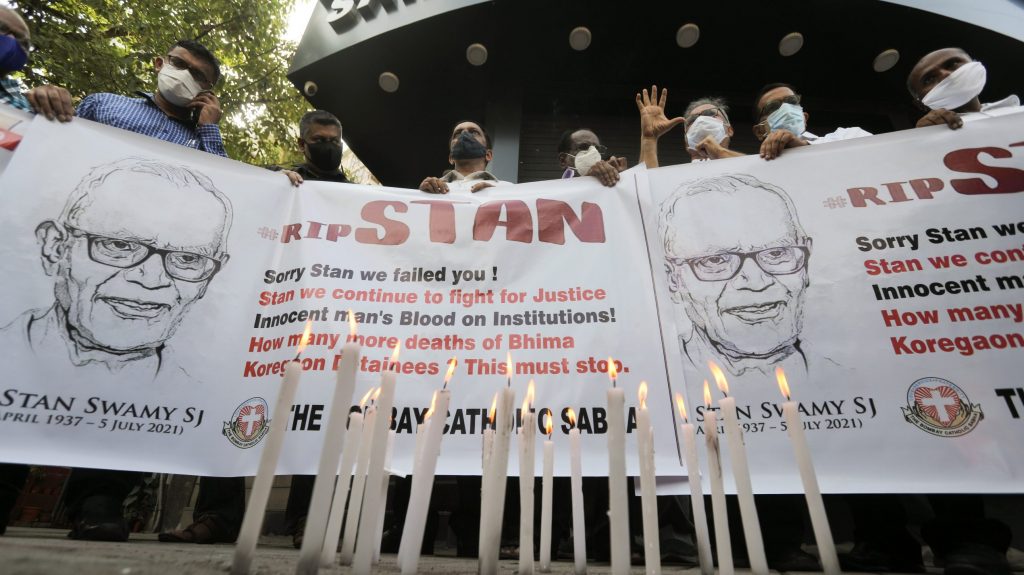The Federation of Asian Bishops’ Conferences (FABC) on Tuesday mourned the death of Jesuit priest Stanislaus Lourduswamy, and called him “martyr of the marginalized people.”
The Indian priest popularly known as Fr. Stan Swamy died on Monday, July 5, at the age of 84; he spent the last eight months of his life jailed on terror charges for his activism on behalf of Indian society’s lowest castes.
In a statement on Tuesday, Cardinal Charles Maung Bo of Yangon, FABC president, said Father Swamy “redefined his priesthood, extending his altar to the streets and hills of those obnoxious corners of injustice.”
The cardinal said that the Jesuit priest - who was known to advocate for the rights of indigenous peoples in India - broke “the bread of good news of human dignity and justice,” especially among the indigenous Adivasi people.
“For too long, the innocent tribals trudged a merciless way of the Cross inflicted on them by corporate greed and unjust laws,” said Cardinal Bo.
He said Father Swamy’s “tireless struggle to liberate these marginalized communities brought him to the peak of Calvary, of incarceration, deprivation and ultimate death.”
“He died as a true disciple of Christ,” added the cardinal.
He compared Father Swamy to Mahatma Gandhi, “the saint who lived for the poor, was arrested and incarcerated under sedition laws by British officials” of his time.
“We take solace in the thought that Father Stan Swamy, too, followed Gandhi’s nonviolent path, with a great love for those in the margins. He is the latest saint of modern India’s poor,” said the cardinal.
He noted that the last months of the Jesuit priest, spent in custody on a hospital bed, “is the most heart wrenching tragedy of an innocent man persecuted for doing good.”
“The custodial hospitalization restrained his movements, but in his death, his legacy is set free now, inspiring thousands in every part of India and the globe,” said Cardinal Bo.
Catholic Church leaders in India have also expressed sadness over the death of the Jesuit priest.
“Father Stan worked tirelessly for the underprivileged and downtrodden, giving them a sense of dignity and upliftment,” said Cardinal Oswald Gracias, president of India’s Catholic bishops’ conference.
The cardinal described the Jesuit priest’s incarceration as “very painful,” adding that he worked “single-mindedly for the poor.”
The Archdiocese of Ranchi, where the Jesuit priest served for many years, described Fr. Swamy as “a champion of tribal rights, a fighter for justice and a symbol of courage.”
In a statement, Archbishop Felix Toppo of Ranchi and Bishop Theodore Mascarenhas, auxiliary bishop of the diocese, said Father Swamy’s incarceration was a “sad reflection on those who got the innocent man arrested and the courts that refused to give him bail.”
“The ‘caged parrot’ now sings in heaven but its blood is on our hands,” said the bishops.
Cardinal Bo said Father Swamy’s mission “will continue and will never succumb to evil,” adding that in his death, “he has shone a damning light on the injustice that is becoming a norm in the world.”
The cardinal said indigenous people have become “expendable to corporate interests and their political enablers.”
He said that for thousands of years, indigenous people have protected the “lungs of Asia” but now “an ecological COVID of greed, has waged a war against these lands and the people.”
“Father Stan Swamy died while accompanying the powerless tribals in their struggle and dream. In mourning him, we also commit ourselves to his dream of a new world of justice and peace,” Cardinal Bo said.
Father Swamy suffered from cardiac arrest on July 4 at 4:30 a.m. and was put on a ventilator, but he never regained consciousness. He was in detention since October 2020, after he was arrested for terror-related offenses under the Unlawful Activities (Prevention) Act.
Indian authorities alleged that the priest supported the cause of banned communist groups through his civil rights organizations.
Authorities tagged the priest’s Persecuted Political Prisoners Solidarity Committee, a human rights organization, as a front organization of Maoist and extremist groups.
The Bagaicha, an organization established by Father Swamy to empower the tribal group Adivbasis, was also tagged as a communist front.
Father Swamy is the oldest person in India to face terror-related charges. He has joined 15 others, including human rights activists, journalists and scholars, who were arrested in connection to a 2018 incident of caste-based violence known locally as the Bhima Koregaon case.
The priest’s supporters said he is being branded as an anti-nationalist, and was jailed because he was fighting for the implementation of laws passed by the parliament for tribal people and their constitutional rights.
Father Swamy was born into a farming family in the southern Indian state of Tamil Nadu. He joined the Jesuits after turning 20. After his ordination, he served as a priest for more than 50 years.

